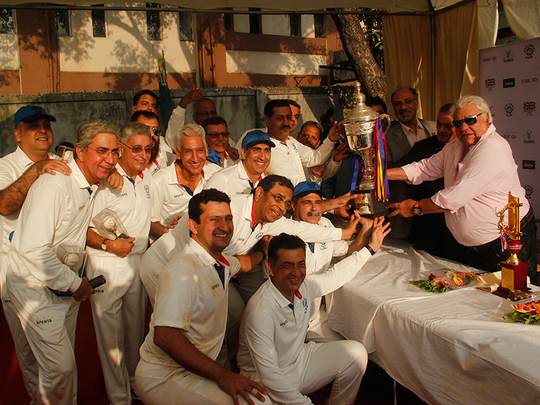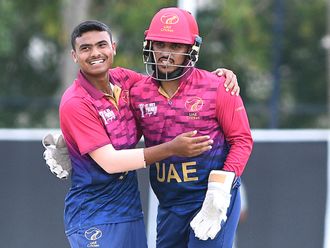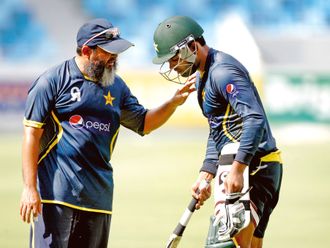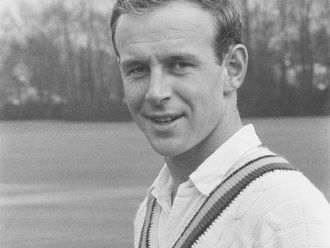
Dubai: At a time when an intense battle is being fought in the ongoing India-England Test series, the Parsis, a community in India who were the trendsetters of many a cricket tour to come between the two nations, celebrated the 130th anniversary of the historic occasion when they toured England for the first time in 1886 to play a series there.
An all-Parsi team took the field against a British eleven for the 1886 Trophy last week at the Parsi Gymkhana ground in Mumbai to mark the occasion.
Speaking to Gulf News, UAE’s veteran cricketer Freddy Sidhwa, who played for the Parsis in the commemoratory match, said: “It was the all-Parsis team led by Dr Dhunjishaw Patel that toured the British shores in 1886 to play 28 games. They won only one match, lost 19 and drew the rest while playing against clubs and towns. Notwithstanding the defeat, the Parsis team toured again in 1888 and won eight out of the 31 matches, and this prompted the England teams to visit India too. An all-amateur England team led by G.F. Vernon visited India for the first time in 1889. The only team they lost to was against the Parsis of Mumbai, and this helped stimulate great interest for the game in India. This tour also went a long way for future cricket exchanges between the two countries.”
In the match that recalled that momentous tour, the Parsis team posted 269 in 30 overs and defeated the British eleven by 68 runs. Septuagenarian Sidhwa opened the bowling attack for Parsi Gymkhana.
Former Indian captain Nari Contractor and former Indian wicketkeeper Farokh Engineer, the two Parsis to have represented India, presented the trophy. The prize-giving ceremony was attended by Professor Ratnakar Shetty, General Manager, Game Development, Board of Control for Cricket in India (BCCI) and Nitin Dalal, Treasurer of Mumbai Cricket Association (MCA).
Engineer, who stopped over in Dubai after the match on his way back to England, said: “It was a historic occasion that made me feel truly humble. Next year’s event will be held in London culminating with a reception at the House of Lords. It’s great to find cricketers like Sidhwa playing and being part of such an event.”
Khodadad Yazdegardi, vice-president and cricket secretary of Parsi Gymkhana, spoke to Gulf News from Mumbai. “We are overwhelmed by the response and sponsorship support for the event. This contest will now be a regular affair to recall that historic occasion. Engineer was the last Parsi to play for India and Zubin Barucha was the last one to play for Mumbai in the Ranji Trophy; but now there is a 15 year old Aryan Irani in the Mumbai Under-16 probables. We hope this match creates more interest among Parsi kids.”
Though the Parsis toured England in 1886, it was only in 1932 that an Indian team toured England to play their first ever Test match.
Though they are a minority community, 12 Parsis have so far played for India. Apart from Engineer and Contractor, the ten others are Phiroze Edulji Palia, a left hander, Sorabji Hormasji Munchersha Colah, a hard-hitting batsman (both of whom were part of the Indian team that toured England in 1932), Rustomji Jamshedji (the oldest Indian debutant of all time who played his only Test in 1933 at the age of 41 against England at Mumbai), Rusitomji Sheriyar Modi (who made his debut in 1946 against England at Lord’s), Khershed Rustomji Meherhomji (played his only Test during India’s second tour to England in 1936), Jamshed Khudadad Irani (born in Karachi but played for India against Australia in 1947), Keki Khurshedji Tarapore (played in only one Test against West Indies in 1948), all-rounder Rusi Framroze Surti (played in 25 Tests), Polly Umrigar (one of India’s finest all-rounders), and Diana Edulji, who captained India’s women’s team.
Incidentally, before the match, all cricketers were served a Parsi-style breakfast. Commenting on the match, Nari Contractor, who survived being hit by a Charlie Griffith bouncer during the West Indies tour in 1962, said: “Parsis played an important part in not just cricket but everything that happened in industries and business in India. I hope they continue to do the same.”
Emigrant success story
Parsis are so called because of their Persian roots since they are descendants of the Persian Zoroastrians who emigrated to India. They live mainly in Bombay and in a few towns and villages north of Bombay, in Karachi (Pakistan) and Bangalore. When they arrived for the first time at the port of Diu in southern Saurashtra in Western India, the local king, Jadi Rana, pointed to a vessel of milk filled to the very brim to signify that his kingdom was already full and could not accept refugees. The Zoroastrian priest added a pinch of sugar to the milk and said that they would not bring the vessel to overflow but instead make the lives of the citizens sweeter. Though their population is declining today, they have excelled in a number of fields.











